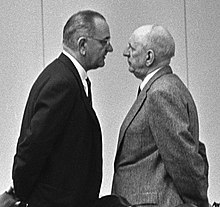This article needs additional citations for verification. (March 2010) |

Political capital ('PC') refers to an individual's ability to influence political decisions. Political capital can be understood as a metaphor used in political theory to conceptualize the accumulation of resources and power built through relationships, trust, goodwill, and influence between politicians or parties and other stakeholders, such as constituents. As politicians can only get the public to focus on a small range of issues at a time, usually through slogans and repetition, which will be discussed in the media cycle. It forces other politicians to engage with those issues as public attention is focused on it, and also leaves them susceptible to being voted out by a more educated public. political capital thus must be spent wisely on which range of issues a leader chooses to prioritise. [citation needed] Political capital can also emerge through sudden shock events that grab public attention, rather than a politician's lobbying, such as 9/11 where George Bush reached an 89% approval rating [1] with a rally around the flag effect and spent his political capital on the War on Terror and the Patriot Act. Political capital can be understood as a type of currency used to mobilize voters, achieve policy reform, or accomplish other political goals. Although not a literal form of capital, political capital is often described as a type of credit, or a resource that can be banked, spent or misspent, exhausted, invested, lost, and saved.[2][3]
Some thinkers distinguish between reputational and representative political capital. Reputational capital refers to a politician's credibility and reliability. It is accumulated by maintaining consistent policy positions and ideological views. Representative capital refers to a politician's influence in policymaking. It is accumulated through experience, seniority, and serving in leadership positions.[4] Thus, political capital—reputational and representative—is the product of relationships among opinion (public impressions), policy (legislative rewards/penalties), and political judgement (prudent decision-making).[5]
- ^ https://news.gallup.com/poll/4924/bush-job-approval-highest-gallup-history.aspx
- ^ Kjaer, Ulrik (2013). "Local Political Leadership: The Art of Circulating Political Capital". Local Government Studies. 39 (2): 253–272. doi:10.1080/03003930.2012.751022. S2CID 220389723.
- ^ Schugurensky, Daniel (2000-06-02). "Citizenship learning and democratic engagement: Political capital revisited". Conference Proceedings. 41st Annual Adult Education Research Conference. Vancouver, Canada. pp. 417–422.
- ^ Lopez, Edward (2002). "The legislator as political entrepreneur: Investment in political capital". The Review of Austrian Economics. 15 (2): 211–228. doi:10.1023/A:1015770705872. S2CID 54888388.
- ^ French, Richard (2011). "Political capital". Representation. 47 (2): 215–230. doi:10.1080/00344893.2011.581086. S2CID 219716486.
© MMXXIII Rich X Search. We shall prevail. All rights reserved. Rich X Search
